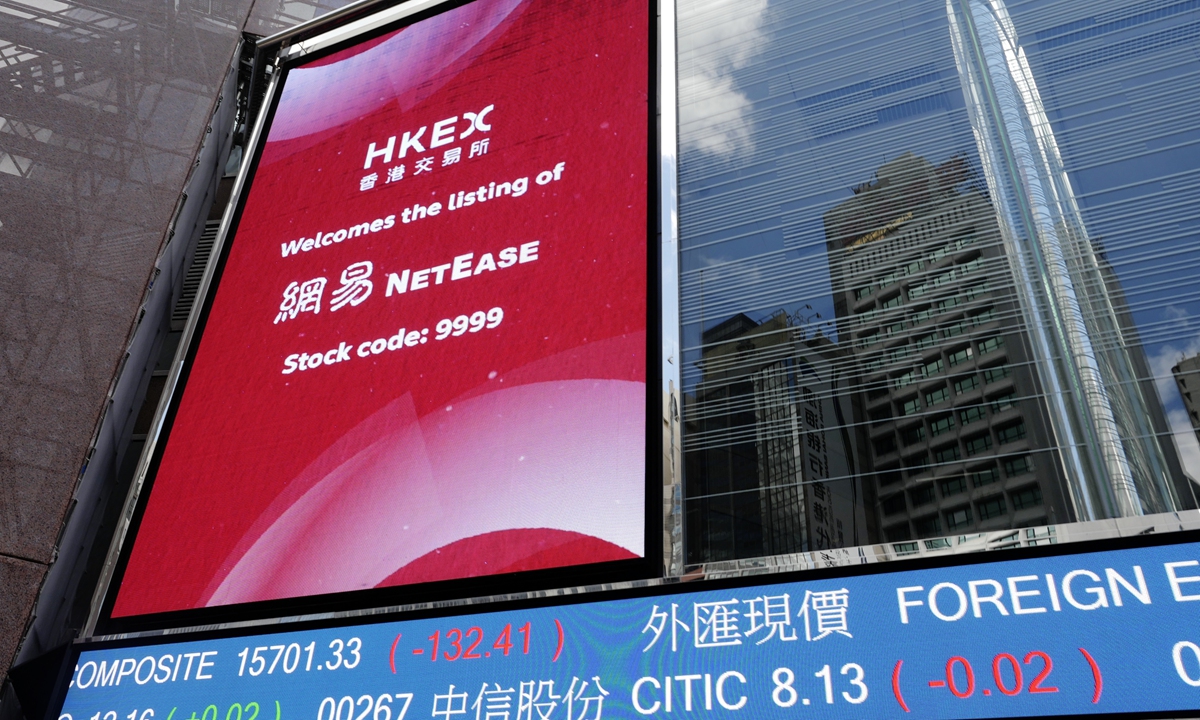US offers boost to HKSAR in financial war with China: analysts
By Li Qiaoyi and Wang Cong Source:Global Times Published: 2020/6/11 20:18:41 Last Updated: 2020/6/11 21:54:14
Washington forces Chinese firms to city, undercuts own financial dominance

The mainland-based internet giant NetEase, which has been listed on the NASDAQ since 2000, sounded the bell in the Hong Kong Stock Exchange with a secondary offering on Thursday. Photo: Xinhua
Top US officials have threatened to impose sanctions on the Hong Kong Special Administrative Region (HKSAR) if China implements the National Security Law in the city, but by wading into a new battleground in its trade and economic war with Beijing, Washington might have actually boosted Hong Kong's status as a global financial center, Chinese analysts said on Thursday.
Under increasing political pressure from the US government aiming to delist Chinese companies, a rising number of mainland-based tech giants are flocking to the HKSAR's stock market for a secondary listing and bringing with them global investors, in a major boost for the city's financial sector amid a set of complex local and global challenges from social unrest and foreign interference to the COVID-19 pandemic.
In a broader and more profound sense, Washington's latest measures in essence put more strain on its own financial market that has helped the US dominate the world for decades and further accelerated an already ongoing power shift in the global economic landscape from the West to China and also the broader Asian community, analysts noted.
New beginning
In a high-profile move on Thursday morning, mainland-based internet giant NetEase, which has been listed on the NASDAQ since 2000, sounded the bell in the Hong Kong Stock Exchange with a secondary offering.
NetEase shares rose 5.69 percent in the Chinese gaming giant's Hong Kong debut, outshining an overall 2.27 percent decline in the market, a promising sign for the homecoming of US-listed Chinese firms amid growing regulatory hostility and US market bubble fears.
"It is an important day because this is the first secondary listing that we have for 2020. We welcome NetEast today. It's an important day for you and it's an important day for us," Charles Li Xiaojia, chief executive of Hong Kong Exchanges and Clearing (HKEX), said on Thursday.
A total of 55 firms have floated on the Hong Kong market this year, raising over HK$25 billion ($3.23 billion), according to Li, expecting more firms to come to Hong Kong and achieve their success.
This could be just the beginning of what could become a widespread trend for Chinese companies listed in the US to return to Hong Kong pushed by a combination of factors, including Washington's growing political and arbitrary crackdowns on Chinese companies and fast economic growth and wealth accumulation in the Chinese mainland, analysts said.
Both the Hong Kong and mainland markets have vacancies reserved for US-traded Chinese firms, Wu Jinduo, head of fixed income at the research institute of Great Wall Securities, told the Global Times on Thursday.
The current trend of Chinese firms fleeing the US and returning to home turf comes across as a choice coerced by US securities' regulatory toughening, Wu believes.
US politicians have been openly called for tighter scrutiny on Chinese companies listed in the US and even threatened to pushing for their delisting from US exchanges. To that end, the US Congress is reportedly pushing for a legislation that could force Chinese companies give up their listings under the name of protecting US investors.
In his presidential memoranda Thursday, Trump also set a 60-day deadline for recommendations on ways to clamp down on US-traded Chinese firms failing to abide by US accounting standards.
To some extent, the US move to force Chinese companies out played right into the hands of Hong Kong officials, who have been relaxing listing rules in recent years to attract more companies to issue IPOs in Hong Kong. Officials in the mainland have also been paving the way for more domestic companies to be listed on domestic markets.
US-traded Chinese firms have largely opted for dual-listing or cross-listing, meaning that if special cases such as US delisting threats occur, the affected firms can swiftly transfer its US-listed shares proportionally to the Hong Kong market so as to better handle emergencies, Wu said, describing it as a defensive tactic for US-traded Chinese stocks amid lingering uncertainties.
Hong Kong is the only financial market across the globe allowing free flows of overseas and mainland capital and plans being mulled over by many firms to relist in Hong Kong would broaden the scope of investment for global investors, she believes.

Pedestrians on the street of Hong Kong's financial district Photo: cnsphoto
A major shift
Even as US officials are trying to kick Chinese companies out of US stock markets, major global stock and bond index managers have started to include Chinese mainland assets and money managers seeking long-term growth opportunities have also turned to China even before the COVID-19 pandemic, CNBC reported on Thursday.
"The most important thing is that the return of US-listed Chinese companies, mainly in internet, technology and consumer businesses, to Hong Kong will bring structural changes to Hong Kong's global financial center, which has been focused on the traditional economy… but will increase the weight of the new economy," Liang Haiming, chairman of the China Silk Road iValley Research Institute and a Hong Kong-based economist, told the Global Times on Thursday.
"For international investors, Hong Kong is the only platform for them to catch the ride of the Chinese mainland. Investing in mainland stocks is like investing in the mainland itself, helping investors reap the benefits of the mainland's development," Liang said.
"The mainland is the firm backbone of Hong Kong's status as a global financial center," he said, noting that the mainland has $3 trillion in foreign exchange reserves that could protect Hong Kong from external attacks.
Hong Kong's position as an offshore financial hub is contingent upon the city's international competitiveness, market watchers said, stressing that the national security legislation for the city helps solidify Hong Kong's rule of law, thereby lending optimism to its financial markets.
JD.com's stock offering of its secondary listing in Hong Kong began on Monday and ended on Thursday. It is reportedly oversubscribed multiple times by both institutional and retail investors.
HKEX announced Thursday that the Chinese e-commerce giant JD.com will make its Hong Kong debut on June 18. Futures and options will also be introduced on the same day.
Presently, 42 Chinese firms trading in the US are eligible for a secondary listing in Hong Kong, accounting for 46 percent of the total capitalization of US-traded Chinese firms, China Business News reported Thursday, citing a financial industry analyst with UBS.
The Hong Kong exchange, with abundant liquidity, is fully capable of housing these firms, the analyst said, if the Hong Kong market becomes the gateway to invest in China's new economy firms, global asset managers will be willing to maintain their positions in these firms seeking to relist in Hong Kong.

Hong Kong residents sign their names on Friday in support of the Hong Kong national security law. A draft decision of the law was submitted to China's top legislature on Friday. Photo: cnsphoto
The US' trade war with China will push US listed companies for a safer market in Hong Kong to avoid overtly politicized regulatory risks in the US, Liang said.In the words of Wu, the US move to exclude firms from other countries participating in its market will only end up pushing the US deeper towards isolation, which is a prelude to backwardness.
It's also worth noting that wild swings in multiple US-listed Chinese firms over the past two days that had triggered numerous trade-halting circuit breakers, rarely seen before, might prompt more Chinese stocks to seek listings in their home markets.
Shares of Chinese fintech firm Jiayin Fintech skyrocketed a stunning 900 percent intraday on Wednesday before tumbling while suddenly approaching closing time. The NASDAQ-listed firm closed at $5.80, up 96.61 percent.
Shares of Chinese finance firm Wins Finance, also traded on the NASDAQ, ended up 170.8 percent.
More strikingly, Chinese online real estate marketplace operator Fangdd.com saw its shares surge initially before diving to hit a circuit breaker on Wednesday. Its shares plunged 66.38 percent by closing time.
The insane volatility amid mounting fears of US stock market bubbles further fuels the homecoming trend.
With the NASDAQ closing above 10,000 points on Wednesday in a fresh closing high, anxiety is piling up on Wall Street that another tech bubble is about to burst.
A worrying sign was an abrupt rout in markets across the Asia-Pacific and Europe on Thursday afternoon Beijing time as a plunge in US stock futures fed panic into the global market.
Emerging markets, especially the A-share market that has been underpinned by China's proven efforts to revive its economy from the coronavirus fallout, would be increasingly eyed by global investors seeking safe havens, Lynda Zhou, equity portfolio manager of London-based Fidelity International, told a video press conference on Wednesday.
The latest rollercoaster ride that US-traded Chinese stocks have been on might be a prelude that more Chinese firms, especially high-tech firms and those state-backed, might pursue secondary listings in Hong Kong or relist in Shanghai's STAR Market, Wu at Great Wall Securities predicted.
Posted in: SOCIETY